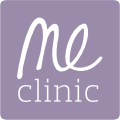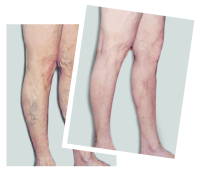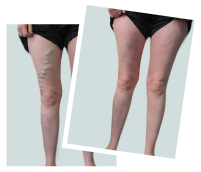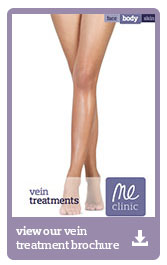(also referred to as venous disease treatment)
Me Clinic provide comprehensive treatment options to venouse diseases including varicose veins, spider veins and venous ulcers. Millions of people globally are affected with vein complications that can range from cosmetic concerns to pain, discomfort and health risks. These vein conditions are common on the the body but can also appear as facial veins.
Surgical Warning: Any surgical or invasive procedure carries risks. Before proceeding you should seek a second opinion from an appropriately qualified health practitioner.
Read more on the Risks of Treatments
We perform the following veins treatments in Melbourne
Alternatives to Veins Surgery
The Me Clinic utilises the latest and most innovative non-surgical veins treatment options that deliver great results. These treatment options are highly effective in managing symptoms and cosmetic concerns in most cases, offering patients significant relief without the need for surgery. Alternatives to veins surgery include the following:
At Me Clinic, we know many of our patients prefer to avoid surgical options where necessary, that is why we focus on non-surgical treatments for varicose veins and spider veins to achieve the same effective results with the least invasive procedures. It is important to acknowledge that in more severe cases and when dealing with larger veins, vein surgical options may be necessary.
It is key to remember results can differ as each patient’s requirements and conditions are not the same. Our highly qualified practitioners and team will carefully assess your requirements and suitable treatment options, while maintaining realistic expectations.
Varicose Veins
Varicose veins are twisted, enlarged veins most commonly seen in the legs, resulting from the pooling of blood due to damaged or weakened valves within the veins. These veins are often large, raised, and swollen, and can appear in shades of blue, red, or flesh-colored. The condition can range from being a mild cosmetic concern to causing significant discomfort and pain.
Symptoms
Symptoms of varicose veins are bigger than spider veins and can vary between individuals. Varicose veins are not always painful, but are commonly distressing and unwanted. Varicose veins symptoms include the following:
- Veins showcasing a deep purple or blue appearance
- Veins appearing enlarged, contorted, or bulging
- Soreness or heaviness in the legs
- Experiencing sensations of tingling, pulsing, or muscle spasms
- Swollen lower legs
- Leg discomfort following extended periods of standing or sitting
- A prickly sensation surrounding the vein areas.
In less severe cases and low level symtpoms, varicose veins can be treated by lifestyle changes, such as exercising, maintaining a healthy weight, and avoiding long periods of standing or sitting. Compression stockings can also provide relief by improving circulation.
In circumstances where lifestyle changes are ineffective, Me Clinic offers non-surgical alternative treatment options that can resolve the cosmetic concerns and attribute to pain relief.
Spider Veins
Spider veins, medically referred to as telangiectasias, are small, damaged veins that manifest prominently on the skin’s surface, often resembling a spider web or tree branches with their red, blue, or purple coloration. While they can appear anywhere on the body, they are most frequently observed on the legs, ankles, face, chest, or abdomen. These veins are typically smaller than varicose veins and lie closer to the skin’s surface, making them a common cosmetic concern rather than a serious medical issue.
In many instances, spider veins are connected to larger dilated blood vessels known as reticular veins, which may cause discomfort, particularly after prolonged standing. Despite their visibility, spider veins are generally not considered dangerous.
Symptoms
In summary, spider veins symptoms include the following:
- Smaller veins that are a dark purple, blue, or red color
- Appearance of veins in a pattern that resembles a spider web or tree branches
- Mild discomfort or itching around the affected area
- A feeling of achiness or heaviness in the legs, especially after standing for long periods
Treating spider veins usually does not adversely affect overall circulation as these dilated blood vessels are not essential for efficient blood circulation and may even enhance it by eliminating inefficient pathways.
Treatment options, primarily aimed at improving appearance and alleviating any associated discomfort, include Sclerotherapy and laser therapy. It’s important to note that spider veins in the lower legs, ankles, or feet can signify more serious varicose vein disease, highlighting the importance of addressing larger internal vein malfunctions to prevent further health issues.
Venous Ulcers
Venous ulcers, commonly found on the lower legs and often near the ankles, manifest as open sores that can be quite painful. These ulcers may exhibit a yellowish slough or feature red, granulating tissue, indicative of the body’s attempt to heal. The primary cause behind these ulcers is chronic venous insufficiency, a condition in which the leg veins struggle to return blood back to the heart efficiently. This inefficiency leads to increased pressure within the veins, ultimately causing significant skin changes and the development of ulcers.
Symptoms
Venous ulcers have higher risk of complications and are associated with more severe skin changes. Venous ulcers symptoms include the following:
- More severe skin changes, including open sores and discoloration
- Discoloration or hardening of the skin surrounding the ulcer
- Swelling of the legs
- Aching in the affected limb
- Itching around the ulcer area
- A feeling of heaviness in the legs
Treatment for venous ulcers aims at both healing the existing sores and preventing future occurrences by managing the underlying venous insufficiency. Methods include compression therapy to support blood flow, various dressings to promote ulcer healing, medications to address symptoms and prevent infection, and potentially surgery to enhance blood circulation. Ensuring timely and appropriate treatment is crucial to avoid complications and improve quality of life.
Vein Therapy Treatment Options
There are several effective vein therapy pathways available for each condition. These include Endovenous Laser Ablation Treatment (EVLT), Sclerotherapy, multiple Laser Treatments, and in more severe cases Varicose Vein Surgery. Following is a quick overview of the options.
Each vein treatment is suitable for different vein conditions, severity and scenarios. Me Clinic’s qualified medical team and vein doctors will assess your circumstances and requests to deliver the best care and treatment options once you book a consultation.
1) Endovenous Laser Ablation Treatment (EVLT or EVLA)
Endovenous Laser Ablation Treatment (EVLT/ EVLA), also known as radiofrequency ablation (RFA), is a treatment method that involves inserting a fibre-optic probe into the vein and using laser light or radio frequency to generate heat, which may cause the vein to shrink and close.
Endovenous Laser Ablation (EVLA) is a highly effective treatment primarily for larger varicose veins, offering significant improvement with minimal scarring. Using laser energy, it closes the problematic veins, rerouting blood flow to healthier veins.
Why the Me Clinic highly recommend EVLA/ EVLT:
- EVLA has been highly effective, especially in yielding desired results from big varicose veins cases
- There is minimal scarring which is impressive considering the size of varicose veins it treats
- It is ideal in more severe scenarios where other conservation treatments may not suffice
- It is more cost effective and less invasive than varicose vein surgery
- Since being integrated in the medical field, EVLA has been the leading treatment for varicose veins
Endovenous Laser Ablation‘s precision and minimally invasive nature contribute to its status as a top treatment option in varicose vein therapy. However, since spider veins are commonly smaller and less severe, other treatment options are more suitable.
2) Sclerotherapy Treatment
Sclerotherapy is a treatment for varicose and spider veins where a sclerosant solution is injected into the affected veins, causing them to collapse and eventually fade. The procedure is minimally invasive and can vary in technique, such as using foam sclerosants for larger veins or ultrasound guidance for veins not visible on the surface. It’s often chosen for its effectiveness in reducing the appearance of veins and alleviating associated symptoms.
Before 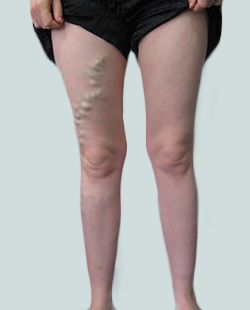
After 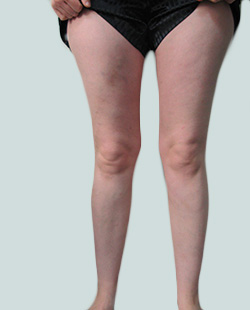
Performed By: Dr Ashley Granot (M0001026218) MBBS, FFMACCS (Med), FACP, FACNEM, ABBRM, MA5M Cosmetic Doctor, Melbourne
3) Laser Treatment
Vein laser treatment is another vein therapy option that can be more suitable for less severe venous disease cases. This non-invasive treatment involves the absorption of laser light into the blood in the vein, which converts to heat and may cause the vein to shrink. This technique is often used to treat small spider veins including the face and may also be suitable for treating small veins on the legs and body.
Vein laser treatments include the following:
- IPL Therapy: Suited for superficial spider veins and facial veins, using broad-spectrum light to target and diminish the appearance of small veins. This treatment is more suitable for darker skin tones.
- YAG Lasers: Effective for deeper and larger veins due to their longer wavelength, making them versatile for a broader range of vein sizes.
- Aura Lasers: For fine spider veins, offering precision treatment with minimal discomfort, ideal for small, superficial vascular concerns.
- Laser Genesis: Primarily used for skin rejuvenation, it can also treat tiny veins on the face by gently heating and reducing their visibility. This treatment is also preferential for darker skin tones.
These vein laser treatments can be used on both the body and face, depending on the specific vein condition being treated.
These methods are less suited for larger varicose veins, where treatments like Sclerotherapy and EVLA might be more effective. Each technology varies in effectiveness based on the vein’s size and location
4) Varicose Vein Surgery
Varicose vein surgery is generally considered for severe cases where other treatments, like Sclerotherapy or laser ablation, are ineffective. Vein surgery is not used for spider veins, which are smaller and closer to the skin’s surface. Varicose vein surgery encompasses Ambulatory Phlebectomy and traditional vein surgery.
- Ambulatory Phlebectomy, less invasive and typically under local anesthesia, involves small incisions to remove veins, suitable for smaller varicosities.
- Traditional surgery, for larger veins, may involve ligation and vein stripping under general anesthesia but is less common due to advancements in minimally invasive techniques.
Can I treat varicose veins without surgery at Me Clinic?
The Me Clinic acknowledges patient’s reluctance of surgical options. Where it is necessary, our vein doctors will utilise alternative vein treatment options like Sclerotherapy and EVLA as they are cost-effective for patients but also widely successful.
With the advancements in the non-surgical vein treatments, it is most likely we can achieve the desired results with the different varicose vein therapy options. However, it is prudent to emphasise with larger, problematic veins causing significant symptoms or complications, varicose vein surgery may be unavoidable.
If you are unsure about the severity of your varicose veins, or want to use less invasive varicose vein therapy options, get in contact with the Me Clinic today. You can book an online consultation with one of our experienced vein practitioners or alternatively call Me Clinic during opening hours.
Diagnosis and Treatment of Vein Conditions
Here is what you can expect before, during, and after your treatment of varicose veins, spider veins and venous ulcers at Me Clinic.
- Consultation
When you contact us, we will arrange a one-on-one consultation with an experienced Me Clinic physician who will:
- undertake an assessment of your individual vein condition
- explain the various vein treatment options and likely outcomes
- identify the appropriate and most effective treatment option
- provide an overview of the treatment process and expected timeframes
- undertake a general medical consult (in most cases), and
- provide a quote outlining the associated costs of treatment.
- Book your procedure
If you decide to proceed with vein treatment, we will schedule a time for you to undergo the procedure.
- Conduct the procedure
The procedure will be performed. Your physician will advise on what to expect following the procedure. Depending on the chosen procedure, most patients are able to return home immediately following treatment.
- Post-procedure
Depending on the type of treatment performed, you may need to attend a post-procedure check-up. We will also be available for you to contact us if you need to discuss any concerns or have any questions.
Veins Treatment Costs
There are a number of factors that can affect the cost of varicose and spider vein treatments. A clear picture will be provided during your initial Me Clinic consultation with one of our physicians. Here is a summary of the main fees involved.
- Consultation fee
- Treatment fee, including anaesthetic fee if applicable
- The number of treatment sessions required
- The type of treatment
- Compression garment
- Post-procedure care
Does Medicare cover my Veins Treatment?
Coverage for vein treatments by insurance or Medicare typically depends on whether the procedure is deemed medically necessary. Cosmetic treatments are usually not covered. It’s important to consult with your insurance provider and provide documentation from a healthcare professional to determine eligibility for coverage based on your specific condition and treatment plan.
Choose Me Clinic for your veins therapy
Varicose vein treatment procedures at Me Clinic offer outstanding results. When you choose Me Clinic as a health care provider, you will benefit from working with a professional clinic with more than 35 years of experience in the cosmetic surgery field. Check out Me Clinic varicose veins treatment before and after photos and success stories from real patients, and contact us for a treatment plan that will transform your appearance.
We are your support team every step of the way, including a quality after-care program to monitor your recovery and ensure you receive the best possible care. Book a consult with Me Clinic today and get your transformative journey started.
Our Practitioners who Specialise in Veins Treatment of the body:
Dr Tim French
Specialist Medical Practitioner / Phlebologist
11 years experience
5,000+ veins procedures
- What is the main cause of varicose veins?
The main causes of varicose veins are family history (genetics), ageing, being overweight, and standing or sitting for extended periods. Women experiencing menopause are also more prone to suffer from varicose veins as are pregnant women.
Can you completely get rid of varicose veins?
Yes, you can completely get rid of varicose veins. These veins are not major blood vessels and when varicose veins are removed the blood will reroute and flow through healthy nearby veins instead. New veins may develop with time.
What are the differences between varicose veins and spider veins?
- Varicose Veins present more physically pronounced symptoms with visible, bulging veins and can include more discomfort and potential for complications like ulcers.
- Spider Veins, while similar in cause to varicose veins, are smaller, less pronounced, and primarily a cosmetic concern, rarely leading to discomfort or complications.
- Venous Ulcers are characterized by open wounds and skin changes, indicating a more advanced stage of venous disease with significant circulation issues.
Are venous diseases painful?
Venous ulcers and varicose veins can cause significant pain and discomfort, with ulcers leading to more severe pain and potential infection. Spider veins, on the other hand, rarely cause discomfort.
Venous ulcers have a higher risk of complications, such as infection and delayed healing. Varicose veins can lead to complications like thrombophlebitis (vein inflammation) and ulcers if untreated. Spider veins have the lowest risk profile, with complications primarily related to cosmetic concerns.
